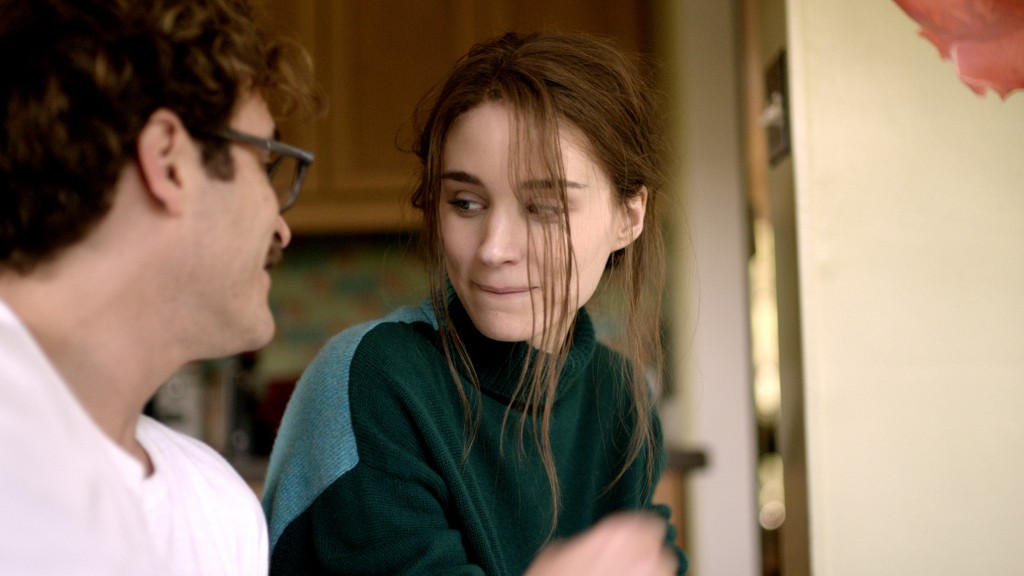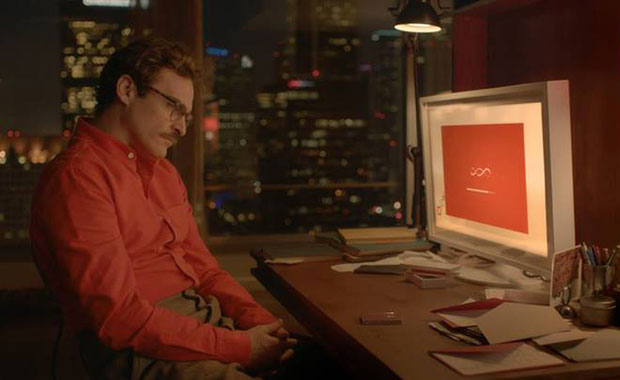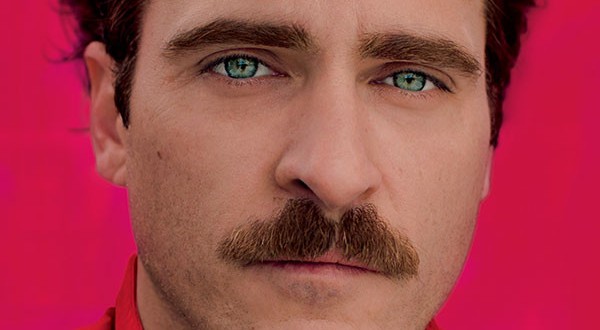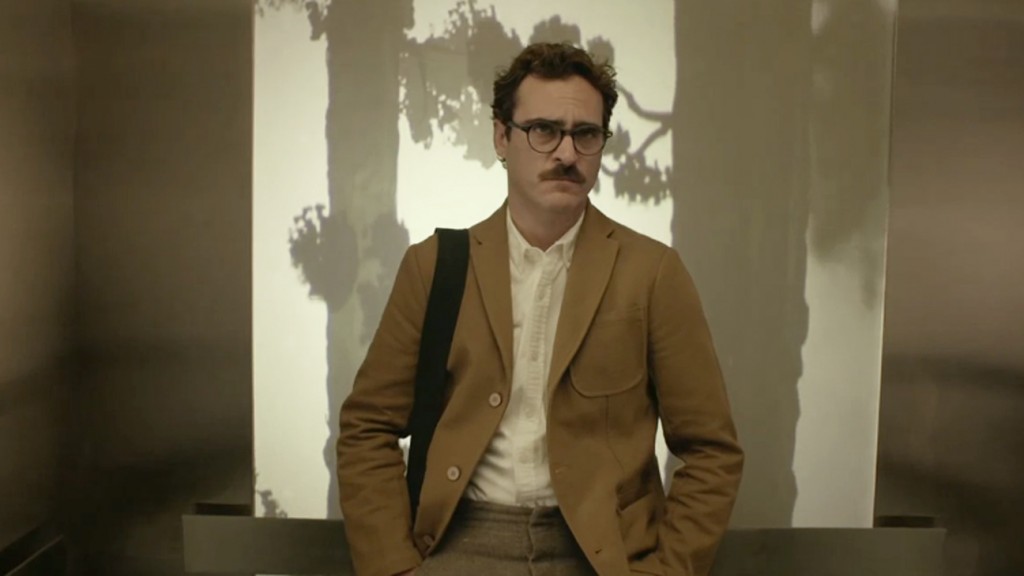So it turns out the future was designed by hipsters and that is in no way a bad thing. Her is a rare triumph for a Valentine’s day release; not in step with the When Harry Met Seattle rom-coms but neither is it entirely devoid of a fun romance. Jonze (who was both writer and director) gave with both hands; delightfully witty and charming farce, playful and concise dialogue, and an exploration of deeply complex themes. Certainly not as sadly enveloping as the trailer may suggest.
Plot
 Her follows the trials and tribulations of one Theodore Twombly (yes that impossibly quirky name is meant to be un-ironic) in the relatively near future. Twombly, played by Joaquin Phoenix, is a lonesome, dejected character we find failing to come to terms with his impending divorce from his now estranged wife Catherine (Rooney Mara). Theodore whilst seemingly the loneliest man in the world seems to also be the most empathetic man too; which as you can imagine is quite the imposition. Satisfyingly enough Twombly can channel is superhuman capacity for ‘feelings’ into his craft. He happens to work at a slightly dystopian moonpig.com (BeautifullyHandwrittenLetters.com); where for a fee Twombly will capture your inner most feelings (in a way you never could), print it out as if you had written it with your own hand and dispatch it to your sweetheart first-post. The movie is well punctuated with examples of these letters just in case you forget how to feel.
Her follows the trials and tribulations of one Theodore Twombly (yes that impossibly quirky name is meant to be un-ironic) in the relatively near future. Twombly, played by Joaquin Phoenix, is a lonesome, dejected character we find failing to come to terms with his impending divorce from his now estranged wife Catherine (Rooney Mara). Theodore whilst seemingly the loneliest man in the world seems to also be the most empathetic man too; which as you can imagine is quite the imposition. Satisfyingly enough Twombly can channel is superhuman capacity for ‘feelings’ into his craft. He happens to work at a slightly dystopian moonpig.com (BeautifullyHandwrittenLetters.com); where for a fee Twombly will capture your inner most feelings (in a way you never could), print it out as if you had written it with your own hand and dispatch it to your sweetheart first-post. The movie is well punctuated with examples of these letters just in case you forget how to feel.
Whilst navigating the not entirely subtle juxtaposition of being a man who helps others access their emotions whilst simultaneously not being adequately able to deal with his own, he finds Samantha (voiced by the endlessly breathy supporter of Illegal Israeli settlements, Scarlett Johannson). His new paramour is in fact a brand new type of operating system for his computer, heralded as not just an OS but a ‘consciousness’ capable of learning and expanding (YOU KNOW LIKE HUMANS DO).
We then follow this not-so unlikely couple along their misadventures as perishable man with organs/skins/gooey-stuff and sentient OS with access to all of human endeavour and knowledge. The results of these misadventures were entirely magnificent.
The Scary, Scary future
So we’re all on board with the future being designed by hipsters right? It means we can all rock a soup strainer and bring back those awesome high waisted trousers that give you the comfort and support you so desperately need. Also in the future computers will not be white, black or silver; they will be backed with rich walnut or mahogany; which I for one could not be happier about. The other thing about the future is Los Angeles ends up looking quite a lot like modern day Shanghai. Which would both be awesome and in no way surprising. Jonze’s decision to only have CGI for the things that would actually be CGI (video games, computers, TVs, phone/ipod jobby etc) makes the whole thing more immersive. The film would have been all the poorer for having a digitally reproduced cityscape and hover-cars because even though it informs the story technology isn’t the subject here.
I [Love-you], Robot.
Her freshens up the speculative genre of u/dystopian cinema. Jonze doesn’t engage with the popularly inevitable conclusion that one day machines imbued with artificial intelligence gain sentience and overthrow humanity in a bloody, bloody coup (either as a enslaved populace throwing off the shackles of an oppressive regime or as overly protective parental guardians of the stupid human race). Instead he gives us the equally likely eventuality that machines imbued with artificial intelligence, gain sentience and then break our hearts.
 It is not strictly speaking a didactic or cautionary tale; it entreats us to examine the questions of how/why and when we love, rather than who is worth loving (or least doesn’t dwell too much on the latter). Amy Adams’ character Amy provides a supporting narrative with a sentient OS of her own; which mostly happens off screen but you feel takes a similar trajectory to our protagonist.
It is not strictly speaking a didactic or cautionary tale; it entreats us to examine the questions of how/why and when we love, rather than who is worth loving (or least doesn’t dwell too much on the latter). Amy Adams’ character Amy provides a supporting narrative with a sentient OS of her own; which mostly happens off screen but you feel takes a similar trajectory to our protagonist.
Phoenix and Johannson’s on-screen candour was seductive when it needed to be and emotionally wrought just as easily. Phoenix was every bit the awkward and quietly brilliant empath, with quirky mannerisms that (should you have gained sentience yesterday), you would want to hold your hand as you discover the world. Johannson’s Samantha was for her part was disarmingly charming and evolved in utterly believable fashion like the high-tech sponge promised to us from the outset. These performances exploring what it means to live and love wrapped up in sumptuous frames that were patient with a hint of lens flare; made Her easily one of the best films I’ve seen in years. Many years, come to think of it.
Verdict: Should you or shouldn’t you? You must.
 Pop Verse Pop Culture Universe
Pop Verse Pop Culture Universe







